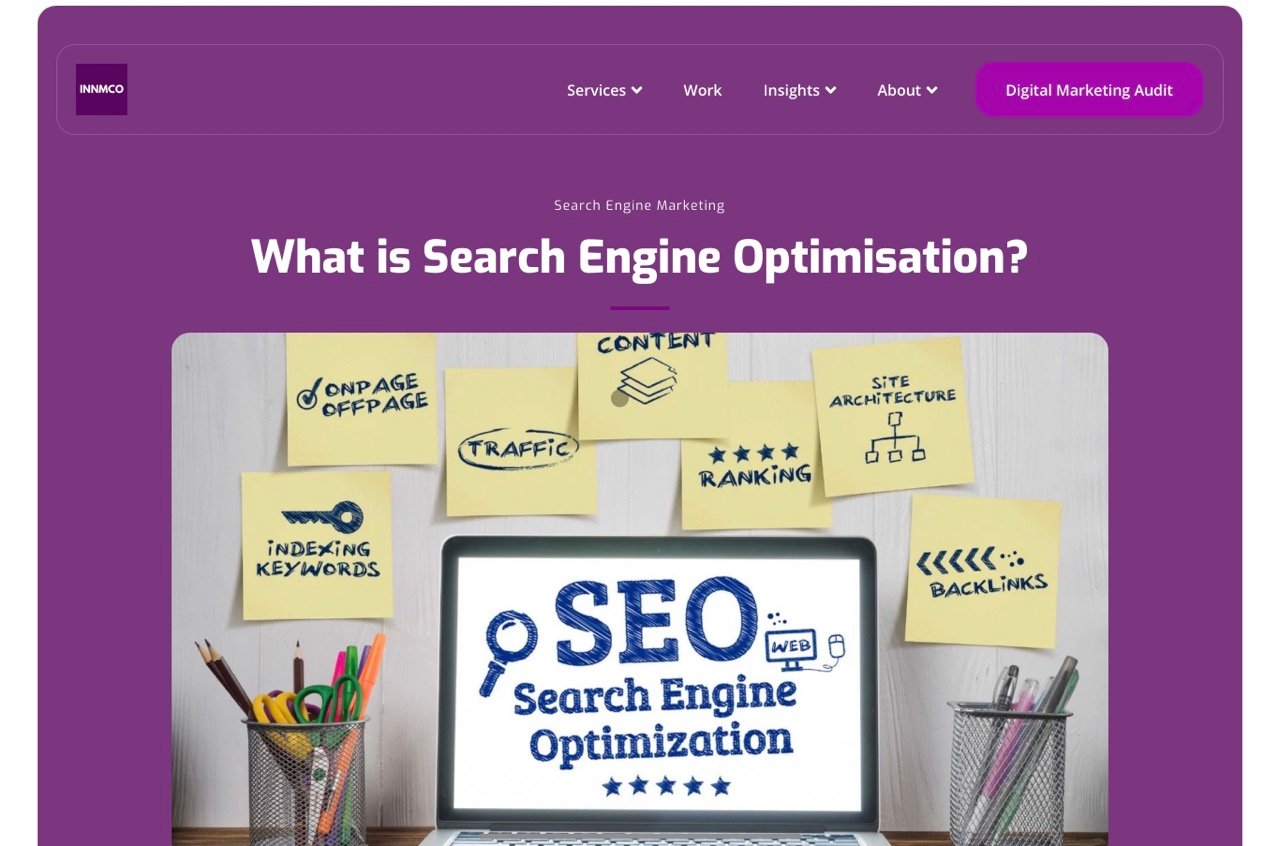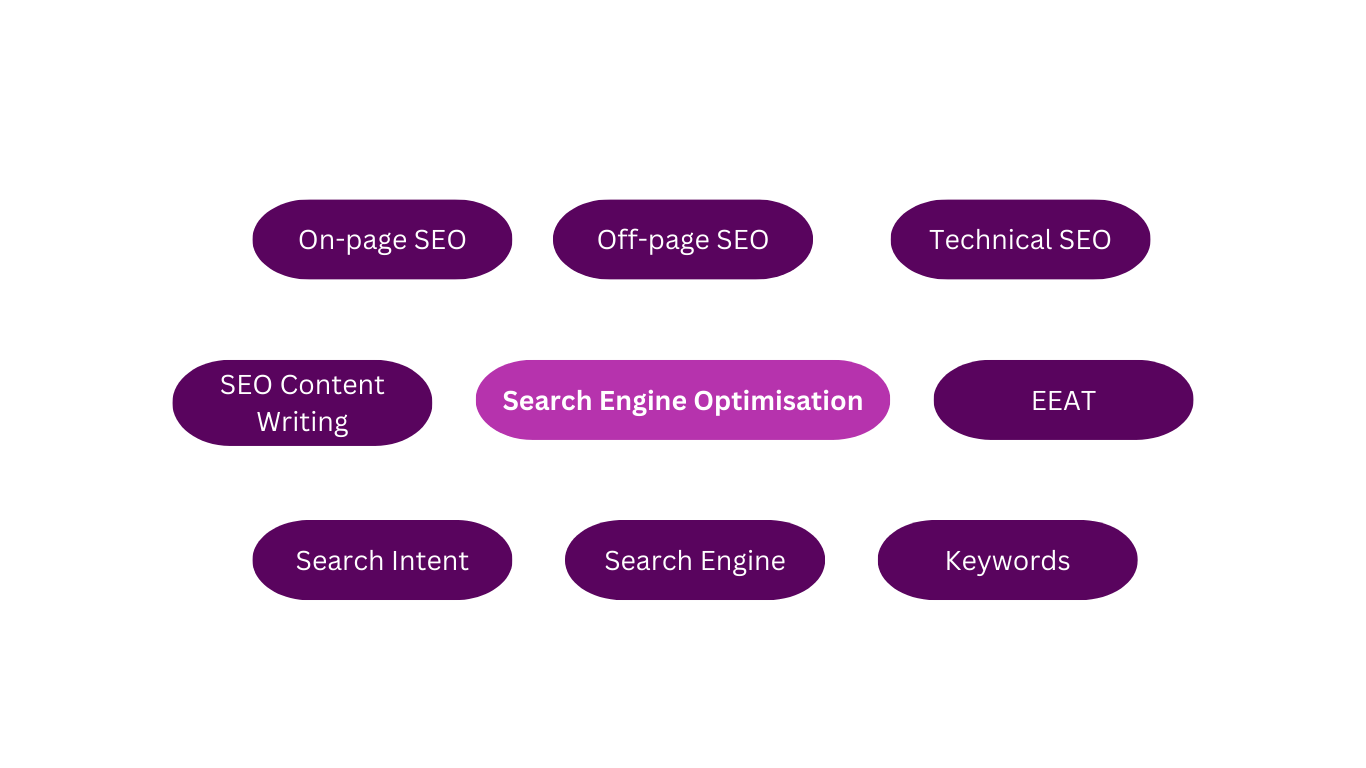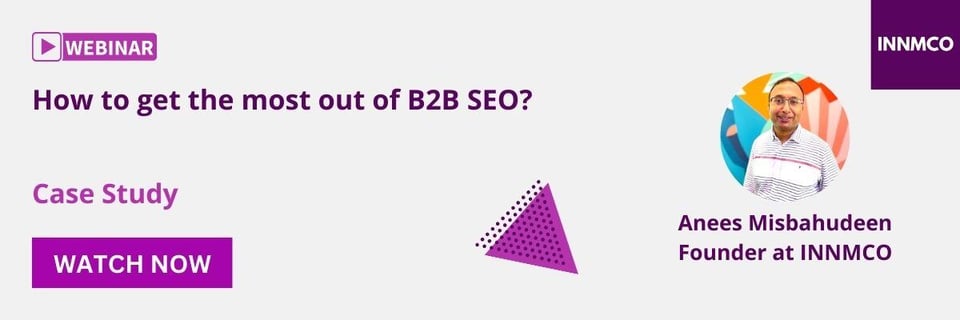Updated on: September 03, 2025
SEO Content Writing: What is it?
SEO content writing is the process of writing content with the goal of ranking higher on search engines. Content needs to be written in a way that is useful for your target audience. It needs to include relevant keywords, address user intent and has good readability.
Table of Contents
1. Brainstorm a list of topics
2. Research keywords and incorporate into writing
3. Create content that matches user intent
5. Case Study - How to get the most out of B2B SEO?
1. Brainstorm a list of topics
Gather insights from your target audience
Identify questions that your target audience is searching for? You may have picked this from user interviews. Have a clear understanding of your customers, their needs, challenges and behaviours. This will help you create quality content that addresses their information needs.
You can also find hints to questions that your target audience searches for in ‘People also search for’ section, at the bottom of Google search engine result pages.

Alternatively, you can get hints while doing keyword research using tools like Semrush and Ahrefs.
Create content that addresses the goals and challenges of your target audience
Address the information needs of your buyer. This will make your brand the go to place for addressing challenges that your target audience faces.
2. Research keywords and incorporate them into your writing
Keywords research is important. These are words used by your target audience in their search queries. Keyword research tools like Semrush and Ahrefs have a huge database of keywords that are being queried in search engines like Google.
This will give you an idea about:
Search volumes: Average number of monthly searches for a given keyword over a 12 month period.
Keyword difficulty: How easy or difficult would it be for a keyword to rank organically in search engine results?
Once you have a made a choice on the keywords that you want to incorporate into your writing of a blog post or web page, start creating useful content.
Create quality content that addresses the needs, goals and challenges of your target audience. The higher the quality of your content, the more likely that Google search engine ranks your content higher in google search engine result pages. This will lead to more clicks and conversions.
Write content in a way that matches the search intent of the buyer. There are 4 main types of search intent.
-
Navigational - When a user wants to find a specific page (e.g. INNMCO’s Services page)
-
Informational - When a user wants to learn more about a topic (e.g. A blog post on ‘What is SEO?’)
-
Commercial - When a user is looking to compare two services providers or solutions (e.g. INNMCO vs another digital marketing agency)
-
Transactional - When a user wants to complete an action, like schedule an SEO consultation or a demo.
Understanding search intent: Start with a deep understanding of your prospective buyer. Prototype and test your product messaging with your target market before you spend money on digital marketing. When a prospective buyer arrives at your business website, ask yourself questions such as:
1. What are prospective buyers seeking to learn when they arrive at your website?
2. How do prospective buyers behave when they are at your website?
Your buyer will better engage with your content when you find answers to the above questions. They will reward you with website clicks and leads for your business.
4. Implement On-page SEO
Incorporate relevant keywords in your page headline, title, meta description, body of the page etc. Do not stuff keywords everywhere, as google penalises you for this. Make your page informative for your target audience while incorporating keywords that your target audience may use in their search queries or search terms.
Page title
Incorporate keywords into your page title. The keywords you choose need to be relevant to your page content. Consider keywords that are used by your target buyer in their search queries. Your prospective buyers will click on your blog post, if your page title captures their user intent and has information that addresses their needs.
In the below example, the title conveys a quick snapshot of the content of the blog. A user looking to learn more about search engine optimisation will click on the link and read the blog post.

Meta descriptions
Include a description of what your page is about. Incorporate your keywords while writing your page description. Make the page description as informative as possible for your target audience.
In the below example, the meta description conveys a quick snapshot of the content of the blog post. A user looking to learn more about search engine optimisation will click on the link and read the blog post.

Page header
Your page headline should convey to your prospective buyer what your page is about. Incorporate your keywords in your page header, where ever possible.

Alternative text for images
Include an alternative text for images used in a page or blog post. This helps google crawlers or bots understand what your image is about.
Page URLs
Your url should convey, what your page is about. Try incorporating your keyword into your url.

Internal linking of pages
Link your website pages to each other. This helps google crawlers to understand your website structure and architecture. This also directs buyers to the next best content that they should be reading on your website.
Latent Semantic Indexing (LSI)
These are conceptually related keywords that search engines use to understand the content on your web page.
In the below example, the search engine will use conceptually related keywords to understand the content on the blog post ‘search engine optimisation’.

Conclusion
To conclude, SEO content writing is the process of writing content with the goal of ranking higher on search engines. Content needs to be written in a way that is useful for your target audience. It needs to include relevant keywords, address user intent and has good readability.
Now that you understand SEO content writing, find out how to implement an SEO strategy for your website.
Watch on-demand webinar - How to get the most out of B2B SEO?
Book Your Free SEO Audit!
Written by
Anees Misbahudeen
Founder and Chief Growth Strategist | INNMCO
.png?width=200&height=125&name=Anees%20Misbahudeen%20-%20Company%20Profile%20(700%20%C3%97%20436%20px).png)
Anees is the Founder and Chief Growth Strategist at INNMCO. INNMCO is a Sydney‑based SEO, Google Ads and content marketing agency focused on driving growth for SaaS companies. Anees works with SaaS teams to improve visibility where it matters. This includes ranking at the top of search results and being referenced in AI‑driven answers. With over a decade of experience, he has supported 30+ brands across SaaS, finance, automotive and startups, delivering measurable growth.
Share
.png?width=75&height=75&name=INNMCO%20Company%20Logo%20-%202025%20(700%20x%20700%20px).png)

.png)



